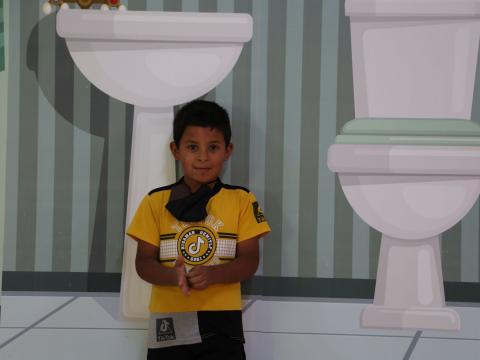Saif’s Story: Nine-Year-Old Boy Practices Personal Hygiene Habits While Meeting Elmo

Jordan which is one of the largest refugee host countries in the region and has been responding to the Syrian crisis since the start of the conflict, deals with a significant water, sanitation and hygiene challenge. The country generates 2.2 million tons of solid municipal waste per year, growing annually by five percent of which only seven percent is recycled or salvaged mainly by the informal sector [1]. This has become a serious matter of concern for the refugee camps, like the Azraq Refugee Camp which hosts more than 36,000 Syrian refugees [2].
Waste, if improperly managed, can have long-term impacts on both the environment and the community, even for those far from the site of disposal. For example, it is estimated that 95 percent of the plastic packaging that enters the economy is discarded as waste, and 32 percent of this waste escapes municipal waste management. [3]
Aid organisations like World Vision took the necessary steps to ensure this need is addressed for the most vulnerable refugees in the camp, and decided to establish a well-structured health sanitation system. The system protects thousands of Syrians living there, ensuring safe disposal of solid waste [4], water networks linked to the shelters, and access to dignified toilets [5]. The sanitation situation is carefully monitored in Azraq Refugee Camp in order to fit decent human living standards.
Solid waste and personal hygiene education make a huge difference during the COVID-19 pandemic
Additional to the health sanitations systems put in place, raising awareness sessions on personal hygiene are provided to 100 girls and boys as part of the same project run by World Vision – ELO WASH Base Funds + Sesame Street. Nine-year-old Saif is one of the refugee children currently enrolled in this project. He goes to World Vision’s Peace Centre twice a week where he loves learning about personal hygiene – how to be clean, wash his hands, brush his teeth and more. “Every time I learn something new, I teach it to my family. I have two sisters, and I show them how to properly wash their hands to keep the germs away, ” says the little boy. Saif also learns about rationing water use, social distancing, COVID-19 prevention, the importance of wearing a mask in these circumstances, and about the safe disposal of plastic, trash and other solid waste. Saif was also proudly wearing a mask during the interview saying, “I wear a mask to keep myself, family, and you safe, so when we cough, we do not spread germs."
War is hard on children
His mother’s decision to enrol him in the Peace Centre was due to the constant radical changes he went through, and the instability in Saif’s life, which negatively affected his well-being. His mother says: “He was insecure, afraid to speak his mind. Being the youngest of my children, he was isolated, and did not talk much.” Saif’s mother hoped that by enrolling him in the Peace Centre, participating in different activities, and being around children his age, will strengthen and build his personality while learning. This proved correct when Saif told his parents he feels good at the centre and started to open up.
“I was extremely happy when I stepped in the centre, I was amazed how beautiful the classes are! The teachers are very nice, I have made two friends here, we learn something new every day,” shares Saif. Being in a safe and comfortable environment helped the little boy to settle down and find some sort of stability in this new place far from home. He was only three-years old when they ventured into the unknown, leaving their home and life behind in search of peace, after the war abruptly started in Syria. Back in Syria, Saif was surrounded by members of their extended family who were showering him with love, affection and he was much loved by the neighbours as well. This traumatic shift from stability to insecurity, was too much for a three-year-old to handle. The family of four were initially internally displaced in the northern parts of Syria, for almost five months before deciding to cross the border, and seek asylum in Azraq Refugee Camp in Jordan. Even when they arrived to safety in Jordan, and the family thought the children can go back to normal, things did not turn out the same as they hoped for. The sudden change and uncertain future still caused little Saif to miss the warmth of his grandparents, aunts, and uncles back home. He wanted his big family to be with them. After all he has been through, this project was the fresh breath of air Saif needed.
When fun equals education: The Sesame Street project
ELO WASH Base Funds + Sesame Street project features lovable characters from Sesame Street. It is funded by Japan Platform and aims to promote healthy personal hygiene behaviours among children in a relatable manner. Elmo and the other characters are used to simplify the material and add a fun spin to the teaching process. The project’s cycle is about 12 sessions instructed by trained facilitators who conduct interactive classes. General health awareness, oral health, and other subjects are being taught to Syrian children at the Azraq refugee camp under this project. Since it started in 2017, more than 10,000 Syrian children (almost 5,000 girls and 5,000 boys) in many implementation sites (Al Azraq Camp being one of them) were able to improve their personal hygiene habits and got to meet characters from Elmo Street. They had so much fun!
[1] Jordan, Success Story “New Solid Waste Recovery and Recycling Contract Improves Livelihood of Waste Pickers in Jordanian landfills”; available online here: http://www.moenv.gov.jo/ebv4.0/root_storage/ar/eb_list_page/20022_jordan_waste_v02_rc_web.pdf
[2]. https://reliefweb.int/report/jordan/unhcr-jordan-factsheet-azraq-refugee-camp-july-2020#:~:text=Azraq%20is%20home%20to%2036%2C874,have%20disabilities%20in%20the%20camp
[3] MacArthur, Ellen, Dominic Waughray, and Martin Stuchtey. “Rethinking Plastics, Starting with Packaging.” World Economic Forum, 2016
[4] https://www.euneighbours.eu/en/south/eu-in-action/stories/green-centre-azraq-refugee-camp-syrian-refugees-clear-streets-brighter
[5] https://reliefweb.int/sites/reliefweb.int/files/resources/Jordan%20UNHCR%20Factsheet%20Azraq%20Sep%202020.pdf